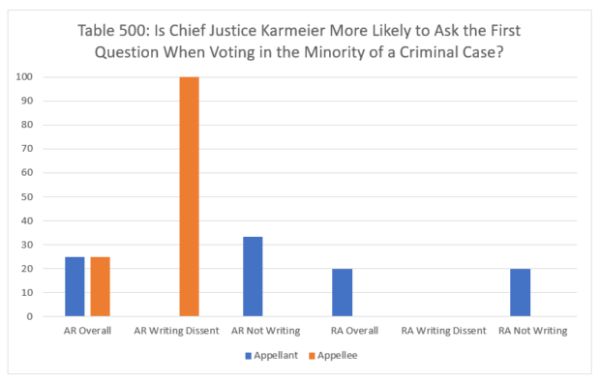Yesterday, we reviewed the data on Chief Justice Karmeier's questions in civil cases between 2008 and 2016. Today, we take a look at a different side of the data – what can we infer when the Chief Justice asks the first question to either side in criminal cases?
Voting against a party did not make the Chief Justice more likely to ask that party the first question, but writing the majority opinion did have a substantial impact. When voting in the majority of an affirmance, there was a 17.69% chance that the Chief Justice would ask the first question of appellants, and a 9.52% chance that he would begin the questioning of appellees. When writing the majority opinion, there was a 30% chance that the Chief Justice would begin with respect to each side. When not writing an opinion in an affirmance, the Chief Justice asked the first question of appellants 15.87% of the time, and of appellees 6.35% of the time.
When in the majority of a reversal, the Chief Justice asked appellants the first question 13.25% of the time, and begun the questioning of appellees 6.63% of the time. When writing the majority opinion, there was a substantially greater chance that the Chief Justice would begin the questioning: 40.74% for appellants, 18.52% for appellees. When not writing an opinion, there was a 7.3% chance that the Chief Justice would ask the first question of appellants, and only a 4.38% chance that he would ask the first question of appellees.

When voting in the minority of an affirmance, there was a 25% chance that the Chief Justice would ask the first question, both of appellants and appellees. In the only case where he wrote a dissent from a criminal affirmance, the Chief Justice asked the first question of appellees.
When voting in the minority of a reversal, there was a 20% chance that the Chief Justice would ask the first question of appellants. In no case did he ask the first question of appellees.

Join us back here next Tuesday as we move onward to the next step in our analysis of the Justices' question patterns.
The content of this article is intended to provide a general guide to the subject matter. Specialist advice should be sought about your specific circumstances.

